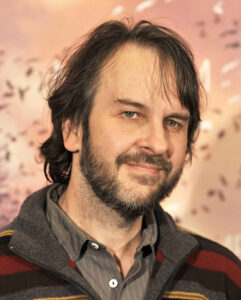Essential DVDs: Braindead (1992); Heavenly Creatures (1994); The Fellowship Of The Ring (2001); The Two Towers (2002); Return Of The King (2003)
Oscars: Best Director, Best Picture, Best Adapted Screenplay (Return Of The King, 2003)
In His Own Words: “What I don’t like are pompous, pretentious movies…I have a moronic sense of humour.”
Peter Jackson is a director who seemed to arrive on the Oscar podium a fully formed auteur without the decades of turmoil to back it up. Before making the biggest trilogy of all time, outside a dedicated fanbase and New Zealand, there was awareness of an ability to realise the most complicated book, bar The Bible, in a way that would be so stunningly lauded both by critics and fans. Yet the hints, not to say the talent or the tribulation, were to be found. He was adept at fabulation, with a particular brand of Gilliamesque schlock horror blended with wry humour (and impactful effect work on a very low budget); just try Braindead’s deranged blood bath. With Heavenly Creatures, the real-life tale of teenage murderers, he indicated that he could handle stories with weight and had a fine eye for casting (Kate Winslet, came care of Mr. Jackson, as would Orlando Bloom). With The Frighteners, hooded figures were swooping over Wellington, a comedy-horror throbbing with atmosphere. All roads, were in fact, leading to Bag End.
From the day he was given a Super-8 camera at the age of eight, Jackson had a fascination with special effects and a fearsome determination to find ways to project his imagination onto the screen. For his first junior project, World War II, he would burn holes directly into the celluloid to simulate the flash of gunfire. For his first major project, the alien gore fest, Bad Taste, he would commandeer his mother’s oven for baking prosthetics, forcing the family to live almost entirely on fried sausages. And when money eventually became more prevalent he would set up Weta digital to create the doughy fantasy land of Heavenly Creatures and eventually the gruesome hordes of Uruk-hai, mumakil and orcs that ravaged Middle-earth.
But none of Jackson’s films is remembered primarily for effects, because he never lets them become the focus. More than any other filmmaker he has managed to use CGI and prosthetics to help tell stories, rather than to simply provide spectacle. In Heavenly Creatures, the CG fantasylands gave a view into the heads of the heroines, always keeping character front and centre. In Rings the battles always rage around a nucleus of well-drawn characters (Jackson writes as vividly as he shoots).
Where George Lucas, whose lead Jackson seems to be following in terms of big budget independence from Hollywood, used his digital mastery to create a photo-realistic fantasy world without believable human inhabitants, Jackson breeds characters first and then erects magisterial settings around them. An intelligent treatment of material coupled with his ability to play to the crowd (even Rings still shows traces of the mischievous gruesome humour of Bad Taste and zombie gadabout Braindead) has won him almost unparalleled respect from audiences and critics. How many other directors could announce that they’re remaking a recognised classic like King Kong and be greeted with cheers rather than howls of derision? He’s fearless, and the best part is, he’s barely even started.
